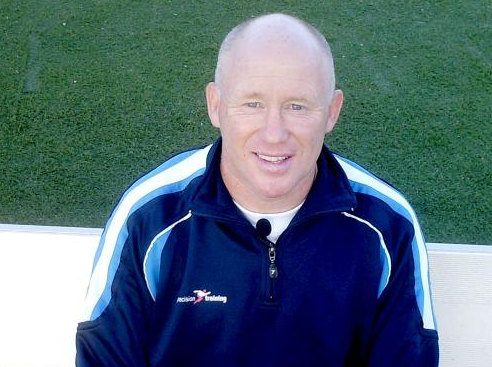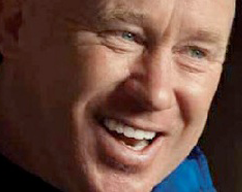Wayne Rooney Was Coached by Tosh Farrell – What Can Farrell Teach You?
Tony “Tosh” Farrell is somewhat of a rarity in the world of soccer – a coach who is as well known for his ability to take youth players and help them develop into world-class athletes as those players themselves. The former Head of International Football Development and Technical Coordinator at the English Premier League (EPL) club Everton FC and now the head of Tosh Farrell Soccer Academies in Amesbury, Mass., Farrell has been called one of the world’s leading youth coaches. His track record bears that out.
As a coach with Everton, Farrell helped to develop a number of top players over the years, including former Everton and now West Bromwich Albion forward Victor Anichebe and current Huddersfield Town striker James Vaughan, the youngest player to ever score in the EPL at age 16. Possibly Farrell’s best known pupil is Manchester United star Wayne Rooney, who stood out even as a young player. During this time, Farrell also developed the Everton Way, his unique Soccer Development Methodology that was the first training program readily available online.
 Farrell holds a number of licenses and certifications, including the UEFA ‘A’ Licence and the English FA Coach Educator Level 1 and 1 Licenses. His work with youth players has been recognized by many top individuals in the world of coaching for its forward thinking.
Farrell holds a number of licenses and certifications, including the UEFA ‘A’ Licence and the English FA Coach Educator Level 1 and 1 Licenses. His work with youth players has been recognized by many top individuals in the world of coaching for its forward thinking.
Former Manchester United sports psychologist Bill Beswick has said Farrell’s focus “is exclusively on the process of development – he knows if he gets this right the score will take care of itself.” Simon Clifford, who founded Brazilian Futebol de Salão schools in England, has said that Farrell is “light years ahead of anyone else.” Former Irish FA Chief Executive Howard Wells has likewise called him “one of the most inspirational coaches of young players I have seen.”
This year Farrell and his Tosh Farrell Soccer Academies have partnered with one.Soccer Schools and founders Lloyd Biggs and Jeff Johnson to provide high-level training to players in Massachusetts.
Farrell recently spoke with GoalNation News editor Diane Scavuzzo about his experiences and beliefs about soccer training and his goals for the future.
Diane Scavuzzo: First of all, what was it like developing Wayne Rooney when he was a youth soccer player?
Tosh Farrell: You don’t know it is Wayne Rooney – as a coach coaching a young player, you just know he is a talented player. If you treat them all the same you don’t have any problems.
Diane Scavuzzo: Was Rooney special?
Tosh Farrell: Wayne was a talented player, and I was just a cog in the realm of things back then. There was no guarantee that he was going to achieve what he has – you have to be careful not throw your eggs in one basket. Some players are late bloomers, so you have to be flexible.
Many a child prodigy falls by the wayside, but not Wayne. As he got older it became obvious that he was focused, and by the time he was 14 or 15, people became aware of his talents. When Wayne would cross that white line on the soccer field, he would turn into a soccer animal. It was black and white with him. He was a very relaxed, calm person on one side of the line and a completely focused animal on the other.
Diane Scavuzzo: What did Wayne do that was different than other players?
Tosh Farrell: Self-practice – he would listen and apply everything he learned. He is someone who on a daily basis wanted to better himself.
Diane Scavuzzo: What do you think about youth soccer in America?
Tosh Farrell: The youth soccer scene has evolved greatly in the past few years, but I can say that the game ratio in the USA out of balance. We need to practice more and play less. If you gave a typical youth soccer player the choice of going to practice or to a game, the player would go for the game but the practice is what is so important.
During a soccer game, a player will have the ball for two minutes max, so in four games you have eight minutes of ball of contact. How can this be beneficial for youth soccer development? It is nonsense.
The environment in America develops the wrong mentality. Players and parents always choose playing games over going to practice, but kids walk to school with a ball or kicking a stone nonstop, and they are having a great time practicing without even knowing it.
 Diane Scavuzzo: What does this do to American youth players?
Diane Scavuzzo: What does this do to American youth players?
Tosh Farrell: The emphasis on the game is creating stereotypes. We are not developing players the way we should. American clubs are training limited techniques, which give you limited options on the field; you put twenty players on the field and they all look the same.
Part of my world was scouting and recruiting for Everton – you would look at a player and ask if they had the potential to be in the program for a sustained period of time and where they could go. Here people have tryouts and they swap out a player who they think is better than the one they have got. You recruit them, and now you have ended up with eye catchers – but now you have to put them around in certain positions. We recruited players first and positions second.
Why have a development program at all if you are going to replace your players every year with tryouts? There is a lack of emphasis on investing in players – really developing players, which takes time.
Diane Scavuzzo: What was your goal when you started the Tosh Farrell Soccer Academy?
Tosh Farrell: The object was purely development – I didn’t want to create teams, but parents wanted them. We had three-year commitments, and out of 300 players we lost 10 players
Diane Scavuzzo: How has the Academy progressed since you began it?
Tosh Farrell: We have gone from getting a beating in the early years when we were developing a style to being very successful. Our program is all about maximizing the players’ potential. Today the teams are now state champions and they are not even trying. We are just playing a style that is alien to the competition. We have produced players that can be better than the top four of the local lads at the EPL Academies.
Diane Scavuzzo: You developed the first training program that was readily available on the Internet. How did that come about?
Tosh Farrell: When Wayne Rooney shot to prominence there were a lot of people who wanted to view what we did. The 7-14 age group was my baby. We had requests to come and visit clubs and speak to them. So we decided to put what I knew into videos and had people subscribe.
Diane Scavuzzo: What steps did you take to develop this training program?
Tosh Farrell: I used to try to get my mindset into what a youth player’s mindset was if I was a seven-year-old player. What do they want? They want to be Ronaldo or Messi – they want to score goals, not be defenders. So I thought, what if they could go to practices and do what they wanted?
It was important there was no fear of failure. We didn’t give them a hard time if they did fail; they were just alive. We built up a slow 2v2 situations and gradually worked with them to get them to do what they wanted – and then grow from there. We tried to do everything in real time.
 Diane Scavuzzo: What do you do with your players today to help them grow?
Diane Scavuzzo: What do you do with your players today to help them grow?
Tosh Farrell: I try to ask them to use their imagination. I ask them questions, and I define words, as there can be a terminology issue. For example, dribbling and running with the ball are different. Kids do not always understand that dribbling is when you have a defender in front of you. So I use clear terminology, and I encourage kids to use their imagination. And I don’t make kids conform.
Diane Scavuzzo: What are other ways that American soccer is different from the game in England?
Tosh Farrell: America has no real history in the game. You can’t just go out and produce a Barcelona. Also, the intensity is greater in America. Kids are hopping from game to game, going through ODP programs, guest playing. The pressure the players are playing under is intense; they have to be the best all the time. They are under the microscope all the time. Why do these players want to be under all this pressure all the time? The love of the game wanes.
Players need a strong mindset and educated parents if they are talented. In England players are protected because they are valuable not on display all the time as a commodity, such as for a scholarship. We are losing the best players when they are 15 or 16 after they have been in the game for several years. They’ve lost the hunger to play because they are under so much pressure.
The game is also different depending on where you are. The California player is different from the East Coast player – more like Spain. The East Coast is more in line with Poland, England or Germany – if we don’t run around we are going to get cold. We can’t coach the real technical way on the East Coast because of the seasons. Likewise in the UK, if it is raining you have to change your session. Technique sessions are being sacrificed
On the West Coast, it is so warm that you can’t run around all the time, so you spend more time developing individual technique. West Coast has more of an environment to coach players technically.
Diane Scavuzzo: What would you like to see done differently in America?
Tosh Farrell: Some parents think that a player has a good boot if a player can kick it far and high, or that a kid is a ball hog if he dribbles well through players. We need to change the mindset. How we achieve this is step by step, and hopefully in a few years parents will see signs of what we are achieving.
Parents need to support the feedback the coaches are giving their players, but clubs are hesitant to educate parents. We tell parents, if you do not like our goals, don’t come into our program.






